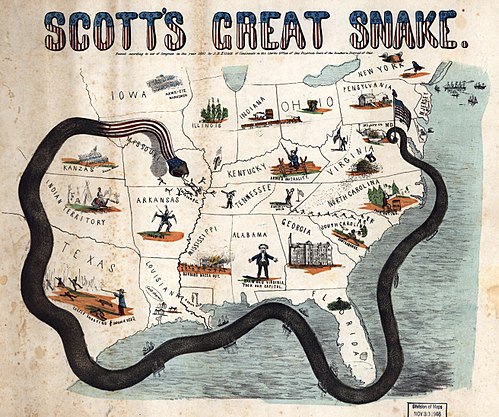Yesterday, George B. McClellan, commander of the Ohio troops, wrote to Winfield Scott, head of all the Union armies, about a plan he had devised for subduing the Southern rebellion. Scott objected to his plan on several points, and proposed his own, which would later be called the Anaconda Plan. He said:
We rely greatly on the sure operation of a complete blockade of the Atlantic and Gulf ports soon to commence. In connection with such blockade we propose a powerful movement down the Mississippi to the ocean... the object being to clear out and keep open this great line of communication in connection with the strict blockade of the sea-board, so as to envelop the insurgent States and bring them to terms with less bloodshed than be any other plan. ... In the progress down the river all the enemy's batteries on its banks we of course would turn and capture, leaving a sufficient number of posts with complete garrisons to keep the river open behind the expedition. Finally, it will be necessary that New Orleans should be strongly occupied and securely held until the present difficulties are composed.Scott's plan relied on the naval blockade of the Southern ports which was already coming into action. He would then move down the Mississippi river and secure New Orleans, and then wait for the South to surrender. This plan was derided at the time, and armies began to move for Richmond. As Scott predicted, they were time after time defeated in battle with heavy casualties. Many of Scott’s strategies were used, such as a strict blockade and an attack down the Mississippi river in conjunction with other attacks. While it is still debated today how effective Scott’s plan would have been if used as he intended it, elements of it did contribute greatly to the ultimate defeat of the Confederacy.
A word now as to the greatest obstacle in the way of this plan - the great danger now pressing upon us - the impatience of our patriotic and loyal Union friends. They will urge instant vigorous action, regardless, I fear, of consequences ....




0 comments:
Post a Comment